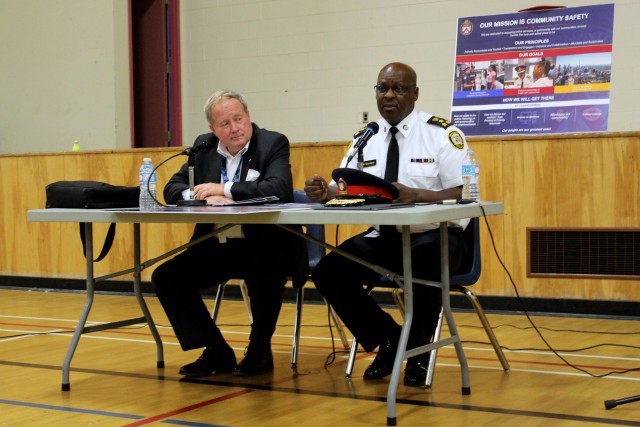Details remain elusive at TPS consultation meeting with Jane and Finch community

At a public consultation at the Driftwood Community Center on 7 September 2016, members of the Toronto Police Service (TPS) – including Chair of the Toronto Police Service Board Andy Pringle and Chief Mark Saunders – engaged the Jane and Finch community in a public consultation to elicit feedback on their interim report aimed at revamping the TPS.
The initiative comes at a time of particular tension between the public and law enforcement, due in part to recent events in the United States, as well as events here at home, including the killing of Sammy Yatim by Constable Forcillo in July 2013, the shooting death of Andrew Loku by Toronto Police in July 2015, and the death of Abdirahman Abdi in July 2016 as Ottawa policeattempted to arrest him. The deaths of these three men reflect a number of common issues, which were rightly raised by the community members present. Their deaths highlight the TPS’s persistent difficulty in handling situations involving those members of society suffering from mental illness. This issue highlights the need for revamped police de-escalation techniques in crisis situations, but perhaps more significantly, it highlights the need for increased accountability and trust between the police and the communities they serve.
The TPS Interim Report, “The Way Forward: Modernizing Community Safety in Toronto,” highlighted five major necessary changes: a change in police relations with the public; the delivery of police services, access to those services, sustainability and affordability, and a change in police culture. The most challenging area and perhaps the area met with the most skepticism was culture change, an area intrinsically related to accountability.
Details of this proposed change in culture and accountability were sparse at the community meeting. Questions were posed by community members relating to other issues such as the broken police complaint system, a legitimate fear of the police within the community, and a lack of consequence for police misconduct. In response, Mr. Pringle and Chief Saunders generally recognized the legitimacy of the issues, reiterated the need for change, and concluded with a statement assuring the community that the TPS is interested in addressing these issues in their final report. Details, however, were not discussed.
The TPS’s interim report was not completely devoid of detail and did provide a high-level overview of some of the proposed changes to come. As a means of enhancing accountability, one recommendation proposed a robust performance-based talent management strategy for TPS members. But this change alone is an insufficient solution. A change in police culture requires more than an enhanced employee-management system like the one proposed; it requires a broader systemic change to our present system in how police misconduct is investigated and disciplined. At present, and despite the existence of a formal system in place to deal with police complaints, the process of filing a complaint against the police can be frustrating and can often produce disappointing and incomplete results, an issue which was raised at the consultation meeting. In our present system, in instances where the Special Investigations Unit (SIU) is called to investigate police misconduct, SIU reports are not made public. The SIU report on Andrew Loku’s death was an exception; it was released at the urging of Black Lives Matter Toronto, and even then, only nine of thirty-four total pages were released, omitting key information. Bureaucratic smokescreens like these unfortunately do little to assure the public that police accountability can be counted on, or that a change in police culture is on its way.
Credit must be given to the TPS’s recognition of the necessity of change in these sensitive and challenging areas, but this recognition is without value unless it can be supplemented with the action, or at least the details of any planned action, to back them up. As with justice, accountability must be seen to be done. Here’s hoping the details to come on the TPS’s proposed change in culture and accountability will result in tangible results sufficient to promote a sense of mutual trust and respect that is so needed within the communities, like the Jane and Finch community, that they are called to serve.
The final report is scheduled to be released in December of 2016.
